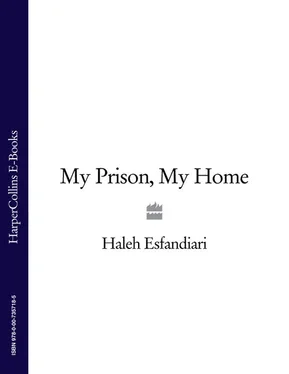We had been on the train for more than an hour when the door opened and a tall, well-dressed woman entered the cabin. She was wearing a mink coat and hat and leather boots; she carried a large leather bag. She sat across from us without exchanging a word. Mother continued to tell me stories in a very low voice. As we neared the Austrian border, the woman closed the curtain and turned off the lights. She needed to sleep, she told my mother. Suddenly the door of the compartment opened and three or four Austrian and Czech officers flipped on the light and asked to see our passports and our bags. They didn’t bother much with us, but they went through the woman’s suitcase and handbag, item by item. I started crying and clung to Mother, wishing again we had stayed in Uncle Max’s beautiful apartment; the woman scolded the officers for frightening a child.
The officers left with our passports, and one of them soon returned and handed Mutti our documents but told the woman to follow him. I remember her saying in German, “ So eine Freschheit ”—Such rudeness. As she bent down to put on her boots, she threw a small package at Mother’s feet and walked out. With a quick motion of her foot, Mother pushed the package under the woman’s seat. All this took place in the dark and in a split second. An hour later, the woman reappeared and without turning on the light asked Mother where her package was. Silently, Mutti pointed under the seat. She retrieved her bundle, took her suitcase and hat, and walked out of the cabin without a word. Uncle Max was livid when he heard the story. Had they searched the cabin, he said, the woman would have denied the package, most probably counterfeit money, was hers, and we would have been in serious trouble.
My father had arranged for us to stay with an Iranian friend of his, Ali Asghar Azizi, who had married into a well-to-do Austrian family. When Mother presented the Azizis with our two suitcases of food, Mrs. Azizi put the ring-shaped salami around her neck and danced across the kitchen with joy.
Yet Vienna turned out to be a journey into almost unbearable loss for Mother. I had never seen her this way, as if in mourning, the hurt written all over her face. Every day of our three-week visit, we would leave the house and take the tram into town. Holding me tightly by the hand, Mother would wander from street to street, from neighborhood to neighborhood, tears rolling down her cheeks. At every turn another piece of her heart would break. She would point at the ruin of a house or building: this was where she had lived as a child; this was where she had gone to school; this was the park where she played; the theater she attended. She kept on whispering, “ Mein armes Oesterreich ”—My poor Austria. We went in search of the building where Father had lived as a student and to the Faculty of Agriculture at Tuerkishenspark where he had gone to university.
We walked along the Stadtpark, where she and Father had danced the waltz, past the opera house and the very exclusive Sacher Hotel and Café Mozart. Vienna was an occupied city, divided into American, British, French, and Russian zones. One evening when we were going home, a group of Russian soldiers boarded the tram. An old man was sitting in the front, holding an empty tin in his hand. One soldier grabbed the tin, put it on his head, and ridiculed the old man. Even as a child I felt his shame and humiliation. Frightened, we got off at the next stop, ran to another street, and waited for an hour in a café before making our way back to the house.
Vienna was a wrenching three-week hiatus during what turned out to be an enchanted eight-month stay in Prague with Uncle Max. I saw beautiful shops, beautiful homes, and elegant hotels and restaurants. I saw my first puppet show and my first children’s play. Mother took me to the opera to see La Bohème and Madame Butterfly. I was given dazzling picture books and toys. I loved the food and the sweets. In the spring, when we boarded a train for Ankara, where a cousin of my father served as the Iranian ambassador, then another train to Baghdad, and finally a bus to Iran, we left my fairy-tale city behind.
By the time we returned from Europe, Father had decided to leave the academic world of Karaj and to join the Ministry of Agriculture. I was almost seven years old. Between the time I was seven and eleven years of age, we moved three times, each time to a slightly larger apartment, but for me life was becoming increasingly restricted. I had no garden in which to play and run around, except when I went to Grandmother’s house or visited friends in Karaj. I was enrolled in Jeanne d’Arc, a Catholic school run by nuns. We followed a double curriculum—French in the morning and Persian in the afternoon. In the morning, I learned about the Alps and the Pyrenees, the river Seine and the river Loire. In the afternoon, I learned about the Zagros and Alborz mountains, the Zayandeh Rud River in Isfahan and the Karkheh River in Khuzistan.
My last year at Jeanne d’Arc coincided with the struggle led by Prime Minister Mohammad Mossadegh to nationalize Iran’s oil industry, then controlled by a British enterprise, the Anglo-Iranian Oil Company (AIOC). The nationalization campaign pitted Iran against both the powerful company and the even more powerful British government, which was the majority shareholder in AIOC. The entire country was caught up in the David-and-Goliath struggle. Political parties—Mossadegh’s own National Front; the Communist Tudeh Party; the ultranationalist Sumka Party, whose members, fascist-style, sported black shirts; the Toilers Party, headed by a politician from my family’s ancestral home, Kerman—vied for popularity and power, while their adherents in secondary schools and Tehran University clashed with one another on the streets. New, highly partisan newspapers appeared and were shut down. Mossadegh, hugely popular, made fiery speeches before massive crowds on the great square outside the houses of parliament.
Even as an eleven-year-old I was caught up in these currents, as were the rest of the students at the normally staid Jeanne d’Arc. We had all become politicized and wanted the British out, and the oil industry in Iranian hands. Mossadegh was our hero, and we, like other students, took up the shout, “ Ya marg, ya Mossadegh ”—“Death or Mossadegh.” Politicians considered insufficiently ardent on the oil nationalization issue, including Mossadegh’s predecessor as prime minister, Ali Razmara, were assassinated. Razmara had signed an oil agreement with the despised British that ardent nationalists considered a sellout of Iranian interests; parliament rejected the agreement. His murder brought the mindless violence close to home. Razmara’s daughter was a student at Jeanne d’Arc, and on the day her father was found dead, the whole school poured out into the schoolyard in sympathy with our classmate. Even the strict nuns could not keep us in the classroom.
The AIOC was finally nationalized by an act of parliament in March 1951, ending in one stroke decades of British control of Iran’s most important industry. The country was jubilant. The Iranian government sent a team of officials to take over the oil company operations. It invited the majority of the British employees to stay on; but the British, in a huff and hoping to cripple the Iranian oil industry, pulled out their technicians and staff. The Iranian team was led by Mehdi Bazargan, a political colleague of Mossadegh, who nearly thirty years later was to become the first prime minister of the Islamic Republic. My father joined the team, seconded from the Ministry of Agriculture to head the oil company’s agricultural department. Mutti, Siamack, and I moved with Father to the city of Abadan, where two years later, my sister, Hayedeh, was born.
Читать дальше












